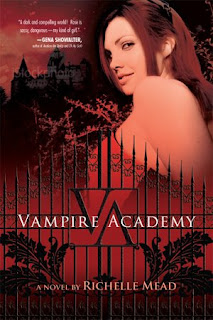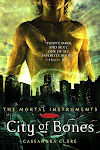 Vampire Academy
Vampire AcademyRichelle Mead
Vampire Academy is set in an alternate universe where the vampire world is at war. The Strigoi—the stereotypical vampire, as they are immortal, drink blood and have excelled strength and speed—are closing in on the Moroi, a species of good vampires with magical powers that believe in peace. The only people in the middle of these two species are the Dhampirs, a breed half-human half-vampire people with the best characteristics of both. The Dhampirs are trained as bodyguards alongside the Moroi to save their own species (Dhampirs can only reproduce with Moroi). Morals and intentions are constantly questioned throughout the story, alongside with the politics and laws that are associated with these species.
At the centre of all this chaos is Lissa—a Moroi princess who is the last person remaining in her Dragomir bloodline—and Rose, her Dhampir best friend bent on protecting her at all costs. The novel begins with their recapture after two years of freedom from St. Vladimir's school, and their reinsertion into the Moroi and Dhampir cliques. Rose undergoes increased training by her mentor, Dhampir Dimitri Belikov, and Lissa traverses the Moroi royalty while hiding her self-abuse.
Things begin to get precarious as soon as it’s made clear that someone knows exactly what Lissa is, and exactly why she left the school two years ago—and are warning her to leave again.
What’s right with it
Mead established the perfect balance of plot and character development, while still giving attention to the quirks that come from being a pair of teenagers in a boarding school—like social problems and boy woes. The “bond” the Lissa and Rose share is a good vehicle in which to display multiple points of view, without jumping out of Rose’s head. You develop much more insight to the character of Lissa, and the troubles she goes through—such as her depression—without Rose actually being with her. Rose herself is a likeable character—she’s the good girl with the bad reputation, the one who always has the witty comeback and the strong fist, the one who is incredibly loyal to those close to her. Her relationship with Dimitri, her trainer, is also an intriguing one. It develops at the right pace, and the sexual tension between the two rolls off the page like smoke.
Mead established the perfect balance of plot and character development, while still giving attention to the quirks that come from being a pair of teenagers in a boarding school—like social problems and boy woes. The “bond” the Lissa and Rose share is a good vehicle in which to display multiple points of view, without jumping out of Rose’s head. You develop much more insight to the character of Lissa, and the troubles she goes through—such as her depression—without Rose actually being with her. Rose herself is a likeable character—she’s the good girl with the bad reputation, the one who always has the witty comeback and the strong fist, the one who is incredibly loyal to those close to her. Her relationship with Dimitri, her trainer, is also an intriguing one. It develops at the right pace, and the sexual tension between the two rolls off the page like smoke.
The surprises are consistent throughout the book, and with something always happening—whether it is training, learning or reckless behaviour—you never grow bored. Unlike a lot of books, which have a giant lead up to a mediocre climax, this book is a series of minor climaxes, before the big problem becomes apparent. It’s one of the best cases of who-dunit, and the culprit is a surprising one that even the most accomplished sleuth probably won’t see coming.
What’s wrong with it
The different species, different families, and shrouded past can become at times a little bit confusing for the reader. Not only are you trying to figure out who the characters are, and what they’re currently dealing with, you’re also trying to figure out what happened two years ago to make them leave the safety of the school in the first place, and how it relates to current events. I found myself re-reading passages, flicking back to previous chapters, or just shrugging off certain things I didn’t understand.
The different species, different families, and shrouded past can become at times a little bit confusing for the reader. Not only are you trying to figure out who the characters are, and what they’re currently dealing with, you’re also trying to figure out what happened two years ago to make them leave the safety of the school in the first place, and how it relates to current events. I found myself re-reading passages, flicking back to previous chapters, or just shrugging off certain things I didn’t understand.
Last word
I loved this book. Being the first of three novels, to say I’m intrigued over what comes next is an understatement. In a post-Twilight world, with young adult vampire novels now more accepted, finding a good one is quite difficult. With this novel I can safely say it is one of the good ones. Period.
Scale-of-awesomeness
Freaking A!


